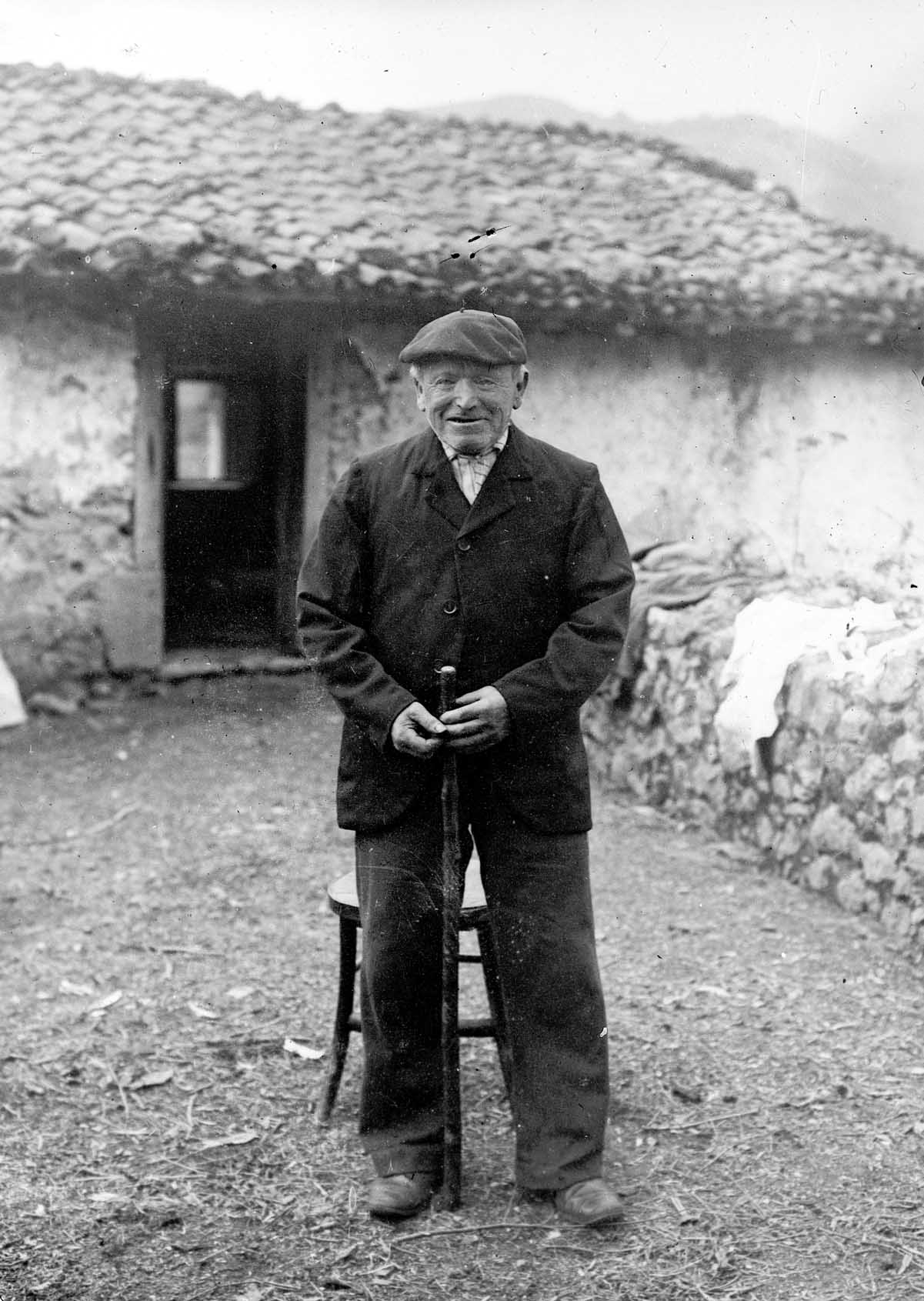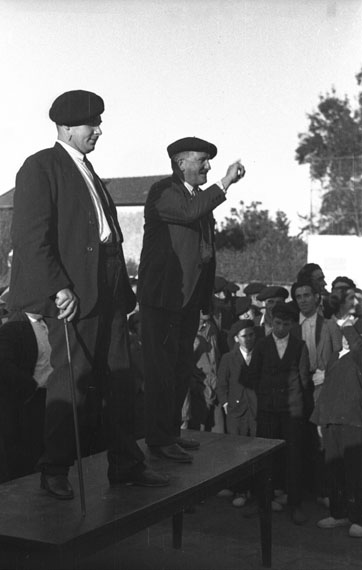|
Pello Errota
Pedro Jose Elizegi “Pello Errota” (1840–1919) was born on the estate of Goikoerrota's Mill near Asteasu, a town in the Basque region of Gipuzkoa, and was one of the best known bertsolaris of all time. A miller by trade, he married Joakina Antonia Bengoetxea from Zizurkil. A small man, he was keen and smart. His quick thinking and singing earned him a bright and prominent role in the bertso Bertsolaritza or bertsolarism is the art of singing extemporaneously composed songs in Basque according to various melodies and rhyming patterns. Bertsos can be composed at a variety of occasions but are performed generally by one or various '' ... scene. As he was a miller and his income was scant, he would accept any request to sing. Good-humored and with a smile always on his lips, he had irony and the capacity to tease. Frequently petitioned to perform, he never refused. Pello Errota sung with all bertsolaris of his era performing at fairs, weddings, contests, etc. He also publ ... [...More Info...] [...Related Items...] OR: [Wikipedia] [Google] [Baidu] |
Asteasu
Asteasu () is a town located in the province of Gipuzkoa, in the autonomous community of Basque Country, in the north of Spain , image_flag = Bandera de España.svg , image_coat = Escudo de España (mazonado).svg , national_motto = ''Plus ultra'' (Latin)(English: "Further Beyond") , national_anthem = (English: "Royal March") , i .... References External links Official WebsiteInformation available in Spanish and Basque. ASTEASU in the Bernardo Estornés Lasa - Auñamendi Encyclopedia (Euskomedia Fundazioa)Information available in Spanish Municipalities in Gipuzkoa {{Basque-geo-stub ... [...More Info...] [...Related Items...] OR: [Wikipedia] [Google] [Baidu] |
Basque Country (greater Region)
The Basque Country ( eu, Euskal Herria; es, País Vasco; french: Pays basque) is the name given to the home of the Basque people. Trask, R.L. ''The History of Basque'' Routledge: 1997 The Basque country is located in the western Pyrenees, straddling the border between France and Spain on the coast of the Bay of Biscay. ''Euskal Herria'' is the oldest documented Basque name for the area they inhabit, dating from the 16th century. It comprises the Autonomous communities of Spain, Autonomous Communities of the Basque Country (autonomous community), Basque Country and Navarre in Spain and the Northern Basque Country in France. The region is home to the Basque people ( eu, Euskaldunak), their Basque language, language ( eu, Euskara), culture and traditions. The area is neither linguistically nor culturally homogeneous, and certain areas have a majority of people who do not consider themselves Basque, such as the south of Navarre. The concept is still highly controversial, and the ... [...More Info...] [...Related Items...] OR: [Wikipedia] [Google] [Baidu] |
Gipuzkoa
Gipuzkoa (, , ; es, Guipúzcoa ; french: Guipuscoa) is a province of Spain and a historical territory of the autonomous community of the Basque Country. Its capital city is Donostia-San Sebastián. Gipuzkoa shares borders with the French department of Pyrénées-Atlantiques at the northeast, with the province and autonomous community of Navarre at east, Biscay at west, Álava at southwest and the Bay of Biscay to its north. It is located at the easternmost extreme of the Cantabric Sea, in the Bay of Biscay. It has of coast land. With a total area of , Gipuzkoa is the smallest province of Spain. The province has 89 municipalities and a population of 720,592 inhabitants (2018), from which more than half live in the Donostia-San Sebastián metropolitan area. Apart from the capital, other important cities are Irun, Errenteria, Zarautz, Mondragón, Eibar, Hondarribia, Oñati, Tolosa, Beasain and Pasaia. The oceanic climate gives the province an intense green co ... [...More Info...] [...Related Items...] OR: [Wikipedia] [Google] [Baidu] |
Bertsolari
Bertsolaritza or bertsolarism is the art of singing extemporaneously composed songs in Basque according to various melodies and rhyming patterns. Bertsos can be composed at a variety of occasions but are performed generally by one or various ''bertsolaris'' onstage in an event arranged for the purpose or as a sideshow, in homage ceremonies, in benefit lunches and suppers, with friends or at a competition. Such a sung piece of composition is called a ''bertso'', the person who sings it is called a ''bertsolari'' and the art of composing bertsos is called ''bertsolaritza'' in Basque. Traditionally these were sung by men but there is an increasing number of young female bertsolaris today. Usually the Basque terms are used in Spanish and French but the Spanish terms ''versolarismo'' and ''bertsolarismo'' and the French terms ''bertsularisme'' (from Zuberoan ''bertsularitza''), ''bertsolarisme'' and ''versification'' are also used. Bertso A bertso consists of two main components: ... [...More Info...] [...Related Items...] OR: [Wikipedia] [Google] [Baidu] |
Zizurkil
Zizurkil (Spanish, ''Cizúrquil'') is a town located in the province of Gipuzkoa, in the Autonomous Community of Basque Country, northern Spain. References External links Official WebsiteInformation available in Spanish and Basque. ZIZURKIL in the Bernardo Estornés Lasa - Auñamendi Encyclopedia (Euskomedia Fundazioa)Information available in Spanish Spanish might refer to: * Items from or related to Spain: ** Spaniards are a nation and ethnic group indigenous to Spain **Spanish language, spoken in Spain and many Latin American countries **Spanish cuisine Other places * Spanish, Ontario, Ca ... Municipalities in Gipuzkoa {{Basque-geo-stub ... [...More Info...] [...Related Items...] OR: [Wikipedia] [Google] [Baidu] |
Bertso
Bertsolaritza or bertsolarism is the art of singing extemporaneously composed songs in Basque according to various melodies and rhyming patterns. Bertsos can be composed at a variety of occasions but are performed generally by one or various ''bertsolaris'' onstage in an event arranged for the purpose or as a sideshow, in homage ceremonies, in benefit lunches and suppers, with friends or at a competition. Such a sung piece of composition is called a ''bertso'', the person who sings it is called a ''bertsolari'' and the art of composing bertsos is called ''bertsolaritza'' in Basque. Traditionally these were sung by men but there is an increasing number of young female bertsolaris today. Usually the Basque terms are used in Spanish and French but the Spanish terms ''versolarismo'' and ''bertsolarismo'' and the French terms ''bertsularisme'' (from Zuberoan ''bertsularitza''), ''bertsolarisme'' and ''versification'' are also used. Bertso A bertso consists of two main components: t ... [...More Info...] [...Related Items...] OR: [Wikipedia] [Google] [Baidu] |
Carlist Wars
The Carlist Wars () were a series of civil wars that took place in Spain during the 19th century. The contenders fought over claims to the throne, although some political differences also existed. Several times during the period from 1833 to 1876 the Carlists — followers of Don Carlos (1788–1855), an infante, and of his descendants — rallied to the cry of "God, Country, and King" and fought for the cause of Spanish tradition ( Legitimism and Catholicism) against liberalism, and later the republicanism, of the Spanish governments of the day. The Carlist Wars had a strong regional component ( Basque region, Catalonia, etc.), given that the new order called into question region–specific law arrangements and customs kept for centuries. When King Ferdinand VII of Spain died in 1833, his widow, Queen Maria Cristina, became regent on behalf of their two-year-old daughter Queen Isabella II. The country splintered into two factions known as the Cristinos (or Isabelinos ... [...More Info...] [...Related Items...] OR: [Wikipedia] [Google] [Baidu] |
Basque Culture
The Basques ( or ; eu, euskaldunak ; es, vascos ; french: basques ) are a Southwestern European ethnic group, characterised by the Basque language, a common culture and shared genetic ancestry to the ancient Vascones and Aquitanians. Basques are indigenous to, and primarily inhabit, an area traditionally known as the Basque Country ( eu, Euskal Herria) — a region that is located around the western end of the Pyrenees on the coast of the Bay of Biscay and straddles parts of north-central Spain and south-western France. Etymology The English word ''Basque'' may be pronounced or and derives from the French ''Basque'' (), itself derived from Gascon ''Basco'' (pronounced ), cognate with Spanish ''Vasco ''(pronounced ). Those, in turn, come from Latin ''Vascō'' (pronounced ; plural '' Vascōnes''—see history section below). The Latin generally evolved into the bilabials and in Gascon and Spanish, probably under the influence of Basque and the related Aquitani ... [...More Info...] [...Related Items...] OR: [Wikipedia] [Google] [Baidu] |







